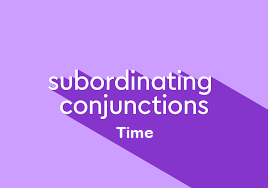News & Events
Subordinating Conjunctions (Time)
- 24 June 2023
- Posted by: admin-rashtielts
- Category: Grammar

Subordinating Conjunctions
(Time)
What is a subordinating conjunction?
A subordinating conjunction is a word or phrase that links a dependent clause to an independent clause. This word or phrase indicates that a clause has informative value to add to the sentence’s main idea, signalling a cause-and-effect relationship or a shift in time and place between the two clauses.
When, after, before, until, since, while, once, as and as soon as are subordinating conjunctions which can be used to connect an action or an event to a point in time.
- She was in a bad car accident when she was young.
- We can’t play loud music after everyone has gone to bed.
- Brush your teeth before you go to bed!
- I’ll wait with you until the bus comes.
- I’ve been very busy since I started my new job.
- No one left the cinema while the movie was on.
- I’ll call you once I arrive.
- We always have an ice cream as soon as we get to the beach.
- I bumped into her as I came out of the bank.
- Many of these time conjunctions can be followed by -ingor -ed forms instead of subject + verb.
Warning:
We don’t use will after conjunctions referring to future time:
- Whenpeople walk into the room, they will feel something special.
Not: When people will walk into the room…
- I will call you as soon asI get to the office.
Not: … as soon as I will get to the office.
1. When, once, as soon as
We can use when, once, as and as soon as to talk about a specific point in time when something happened or will happen:
- When we were in Greece, we went to as many islands as possible.
- They always close their curtains once they get home in the evening.
- As soon as we hear any news, we’ll call you.
2. Before, after and until
We use before and after to talk about the order of events in the past or future. With before and after, either the main clause or the subordinate clause can come first:
- She’ll pick you up before she comes here.
- After she comes here, she’ll pick you up.
Until as a time conjunction means up to a time in the past or future. In the case of until, the main clause usually comes first:
- I’m going to wait until the January sales start to buy a new jacket.
- Until he mentioned his name was Doug, I thought he was called Damien! (less common order)
- We spell until with one l. (Not: untill)
3. While
We use while to show that actions or events happen at the same time in the past, present or future:
- Can you wait in the car while I run into the shop?
- They were talking while the teacher was explaining the activity.
Comma placement and subordinating conjunctions
Subordinating conjunctions that fall in the middle of a sentence are generally not preceded by a comma. This is the opposite of what is done with coordinating conjunctions, or words that join two independent clauses (for, and, nor, but, or, yet, and sometimes so).
When a subordinate clause begins a sentence, however, the whole clause (but not the subordinating conjunction itself) is followed by a comma:
incorrect Whenever, Batman was away, Robin drove the Batmobile.
correct Whenever Batman was away, Robin drove the Batmobile.
incorrect Robin drove the Batmobile, whenever Batman was away.
correct Robin drove the Batmobile whenever Batman was away.
Javidan Language Centre
www.rashtielts.ir
